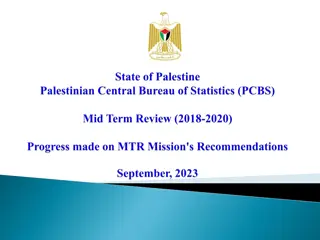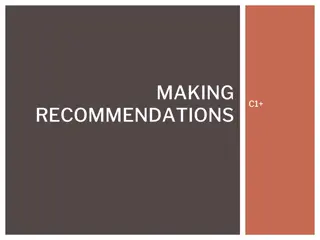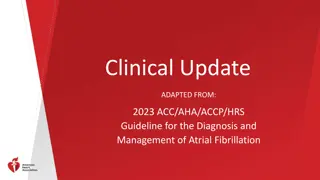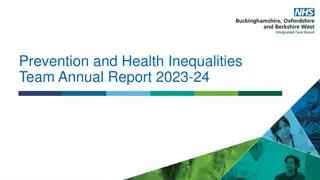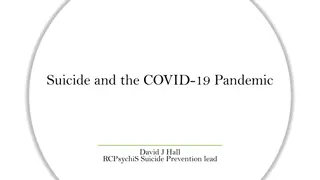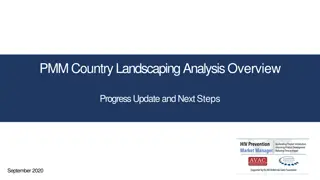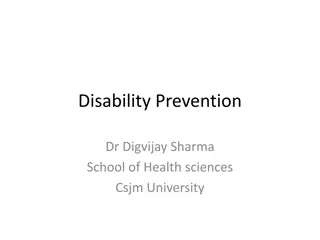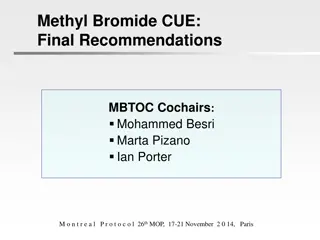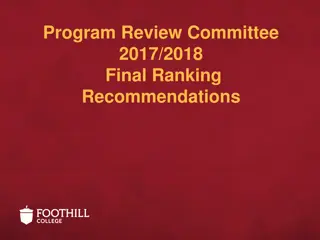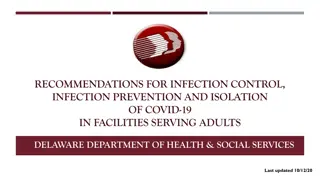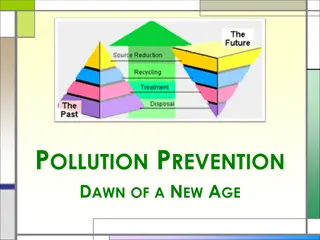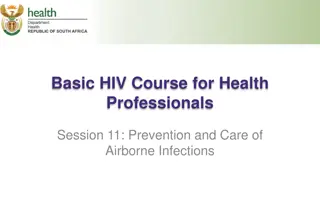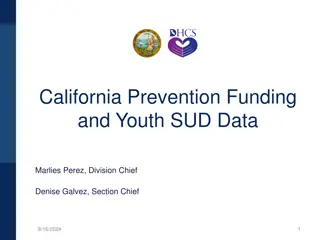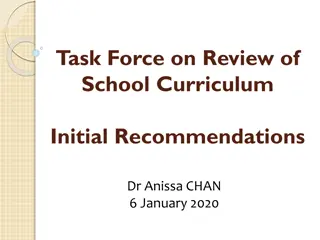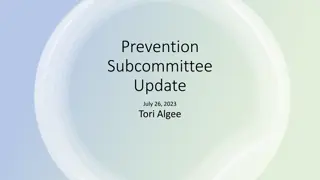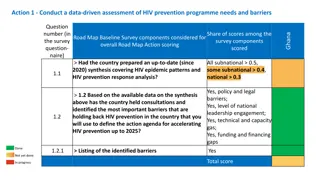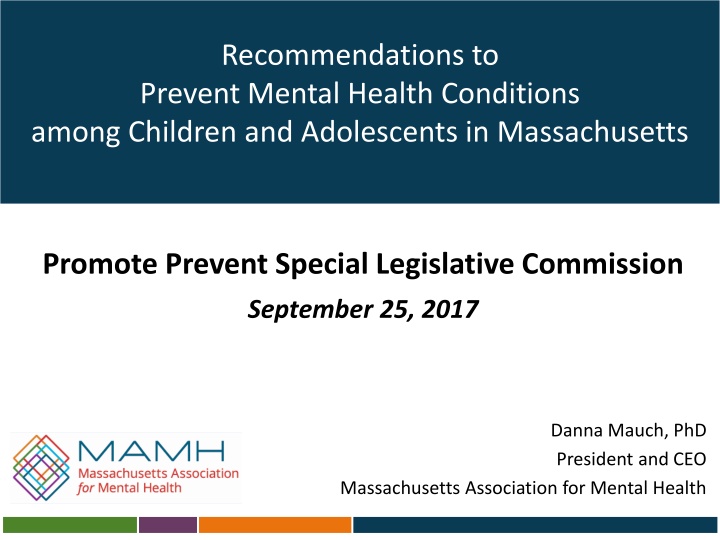
Preventing Mental Health Conditions in Children and Adolescents: Recommendations by Massachusetts Association for Mental Health
Learn about the importance of prevention and early intervention in addressing mental health conditions among children and adolescents in Massachusetts. Explore recommendations provided by the Massachusetts Association for Mental Health to promote mental well-being and combat disparities. Find out how early onset of mental health conditions can lead to various challenges in adolescence, and discover the critical need for effective treatment and support for children and teenagers struggling with mental health issues.
Download Presentation

Please find below an Image/Link to download the presentation.
The content on the website is provided AS IS for your information and personal use only. It may not be sold, licensed, or shared on other websites without obtaining consent from the author. If you encounter any issues during the download, it is possible that the publisher has removed the file from their server.
You are allowed to download the files provided on this website for personal or commercial use, subject to the condition that they are used lawfully. All files are the property of their respective owners.
The content on the website is provided AS IS for your information and personal use only. It may not be sold, licensed, or shared on other websites without obtaining consent from the author.
E N D
Presentation Transcript
Recommendations to Prevent Mental Health Conditions among Children and Adolescents in Massachusetts Promote Prevent Special Legislative Commission September 25, 2017 Danna Mauch, PhD President and CEO Massachusetts Association for Mental Health Massachusetts Association for Mental Health
Massachusetts Association for Mental Health Mission and Vision MAMH is committed to advancing mental health and well being by promoting prevention, early intervention, effective treatment and research to address social, emotional and mental health challenges. Forging understanding and combating disparities since 1913 Massachusetts Association for Mental Health
Overview Importance of prevention for children and adolescents Addressing disparities in prevention investments Bringing evidence-based practices to scale Integrated Pediatric Primary Care - MYCHILD SOS Signs of Suicide Summary of recommendations Massachusetts Association for Mental Health
Prevention and Early Intervention are Essential 1 out of 7 children, ages 2 to 8 years, were reported to have a diagnosed mental, behavioral, or developmental condition1 Children with mental, behavioral, or developmental conditions were more likely to: Have a parent who reported: Fair or poor mental health Trouble getting by on family s income Live in a neighborhood that: Lacked support (neighbors didn t watch out for each other) Didn t have amenities (like sidewalks or libraries) Was in poor condition The literature shows that early onset of these conditions in young children is related to a variety of problems in adolescence, including school drop out and justice involvement.2 1Bitsko, Holbrook, et al., MMWR Morb Mortal Wkly Rep 2016;65:221 226. DOI: http://dx.doi.org/10.15585/mmwr.mm6509a1; 2Brauner, Stephens. Public Health Reports. 2006;121(3):303-310. Massachusetts Association for Mental Health
Prevention and Early Intervention are Essential 46% of 13 to 18 year olds, either currently or at some point during their life, have had a mental health condition1 of 13 to 18 year olds, either currently or at some point during their life, have had a severe mental health condition2 21% of children with mental health conditions, ages 8 to 15 years, did NOT receive treatment for their condition in the past year3 Half of students in grades 9 through 12 in the U.S. seriously considered attempting suicide in the past 12 months 17% 1,2Available at: https://www.nimh.nih.gov/health/statistics/prevalence/any-disorder-among-children.shtml, severe requires survey respondents to report both distress and impairment; 3 Available at: https://www.nimh.nih.gov/health/statistics/prevalence/index.shtml; 4Available at: https://www.cdc.gov/violenceprevention/pdf/suicide-datasheet-a.pdf Massachusetts Association for Mental Health
Prevention and Early Intervention are Essential Mental Health Concerns Start Early: 50% of all lifetime cases of diagnosable mental illness begin by age 14. 75% of begin by age 241 Parents often report concerns before age 52 Those who exhibit symptoms at a young age are more likely to engage in risky behavior, which further increases risk There Are Two Paths We Can Take: Increased likelihood of positive outcomes Increased Protective Factors Prevention/ Intervention Early signs and symptoms Increased Risk Factors Increased likelihood of negative outcomes NO prevention or intervention 1 Kessler, et al., 2005; 2National Research Council and Institute of Medicine, 2009 Massachusetts Association for Mental Health
Disparities in Prevention Investments The Commonwealth has placed increased emphasis on community-based prevention in recent reform efforts: Patient-centered medical homes Accountable care organizations Prevention and Wellness Trust Fund Pay For Success However, investments of public dollars in substance abuse prevention remain very modest, and there is virtually no investment of public dollars in mental health prevention. Massachusetts Association for Mental Health
Disparities in Prevention Investments Why is there so little public funding for mental health prevention? BLOCK GRANTS Community Mental Health Services Block Grant Substance Abuse Prevention and Treatment Block Grant 100% of award for services for adults with SMI and children with serious emotional disturbances. No less than 20% of award dedicated to substance use primary prevention strategies. Massachusetts Association for Mental Health
Disparities in Prevention Investments Recommendation: Close the gap in public funding for mental health prevention services. Without adequate investment, there cannot be concerted mental health prevention programming here in Massachusetts. Massachusetts Association for Mental Health
Bringing Evidence-Based Practices to Scale There are evidence-based practices in mental health prevention that should be brought to scale. Investment in evidence-based practices is a prudent use of limited tax dollars and is a demonstration of fiduciary responsibility. Two examples targeting young children and adolescents: Integrated Pediatric Primary Care - MYCHILD SOS Signs of Suicide Massachusetts Association for Mental Health
Integrated Pediatric Primary Care Mental health is the #1 medical expense for children in America.* Early Childhood Mental Health (ECMH) Integration in Primary Care: Reaching children and families early to optimize opportunity Ignoring early childhood mental health is expensive MYCHILD Partnership MA EOHHS, MA DPH, Boston Public Health Commission Worked with Bowdoin Street Health Center, Health Care for the Homeless, Dorchester House, Charles River Community Health Supported children, birth through first grade, and their families * SOURCE: AHRQ 2009. Massachusetts Association for Mental Health
MYCHILD Introduction and Model Massachusetts Association for Mental Health
MYCHILD Evaluation Results Summary Significant, positive outcomes for both children and adults As measured by evidence-based tools, MYCHILD resulted in statistically significant: Reduced levels of parenting stress and depression symptoms Improved child mental health and social emotional wellness Lower cost of care Medicaid data was used to compare MYCHILD children with a matched group: MYCHILD children had a lower cost of care on average per month; MYCHILD costs were $164.21 less per child per month vs. controls MYCHILD children were more likely to receive appropriate, non- stigmatizing diagnoses Massachusetts Association for Mental Health
MYCHILD Family Outcomes: Parental Stress Index n=58 120 Significant Stress (n=40, 69%) 110 PSI Total Stress 100 Typical Stress (n=18, 31%) 90 80 Stress Limit 70 60 Baseline Six-Month Follow Up Twelve-Month Follow Up Overall model fit: Chi sq=15.24, df 2, p<.0005 Massachusetts Association for Mental Health
MYCHILD Child Outcomes: Child Behavioral Checklist 90 n=33 80 Clinical Concern (n=20, 61%) CBCL Total Problems T-Score 70 Non-Clinical Concern (n=13, 39%) 60 50 Clinical Limit 40 30 Baseline Six-Month Follow Up Twelve-Month Follow Up Overall model fit: Chi sq=17.39, df 1, p<.0001 Massachusetts Association for Mental Health
MYCHILD Family Story A Parent s Perspective In my family, disciplining was hitting and screaming. I didn t want that for my kids I learned how to think for myself, how to help myself, how to be a better mom and understand my children. I have the relationship with my kids now that I always wanted to have with my parents and never had when I was growing up. Massachusetts Association for Mental Health
Integrated Pediatric Primary Care Building a body of knowledge MetroWest Health Foundation Investing in early childhood mental health integration in primary care Grantee: Southborough Medical Group and Advocates Outcomes (July - December 2016): Improved access to behavioral health services Timeliness: Increase in the number of patients seen on the same day as the referral from the pediatrician Engagement: 81% of patients with an initial behavioral health evaluation attended their second appointment Addressed language and cultural barriers to care Improved communication between patients and providers on behavioral health and social concerns Massachusetts Association for Mental Health
Integrated Pediatric Primary Care Recommendations Recommendations: Build on progress in our state: Every child on MassHealth gets screened at well child visits, but pediatricians don t necessarily know what to do or have the resources to act on the results Support implementation of the model beyond the pilot sites, providing better care at lower cost Move beyond pilot efforts and fund a system that integrates early childhood mental health prevention and promotion activities into current practices Normalize the medical home as a place to turn for support with challenges to child emotional health Massachusetts Association for Mental Health
Signs of Suicide (SOS): Program Description School-Based Suicide Prevention Program for Middle and High School Students Curriculum: Administered through video and discussion Promotes concept that suicide is directly related to mental illness Students taught to recognize the signs of suicide in themselves and others Taught to: A Acknowledge C Care T Tell Screening: Every student completes the Columbia Depression Scale Students self-assess and then are encouraged to seek help They are provided an inventory of the resources available if they would like to seek help. Massachusetts Association for Mental Health
Signs of Suicide (SOS): Evidence Base SOS is an Evidence-Based Practice that has been proven effective in replicated studies Students who receive the intervention are 64% less likely to attempt suicide SOS training leads to a greater likelihood of intervening with friends and family who may be exhibiting signs of suicidal intent and of seeking help for themselves SOS training leads to greater knowledge of depression and suicide 64% Massachusetts Association for Mental Health
Signs of Suicide: Building Blocks SOS has already been adopted by school districts across the state and has received funding from multiple foundations Massachusetts Association for Mental Health
Signs of Suicide: Building Blocks Recommendations: Support implementation of the SOS model in schools across Massachusetts Fund universal adoption of SOS in every middle and high school in Massachusetts Massachusetts Association for Mental Health
Recommendations - Summary Summary of Recommendations: Start promotion and prevention early to optimize opportunity Close the gap in funding for mental health prevention Invest in universal adoption of evidence-based practices in mental health promotion and prevention Thank you: Jessica Larochelle, MPH Director of Public Policy and Government Relations Genevieve Mulligan, BA Policy Research Associate Danna Mauch, PhD President and CEO dannamauch@mamh.org Massachusetts Association for Mental Health

